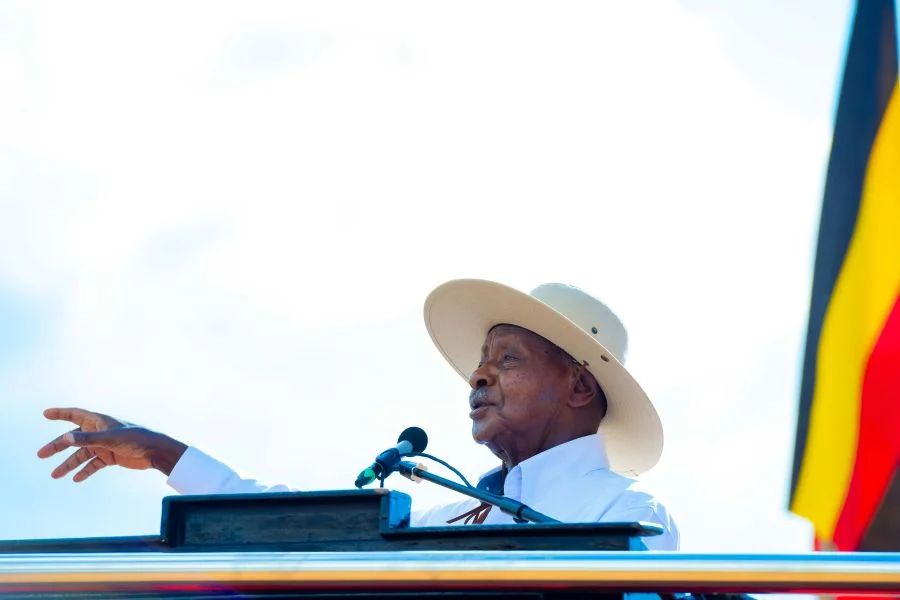Uganda Teeters on Edge as Nation Awaits Crucial Presidential Address

Uganda’s political climate has grown increasingly volatile, marked by a surge in politically motivated violence, allegations of state-sponsored abuse, a fragmented opposition, and rising diplomatic tensions.
As the country awaits a highly anticipated presidential address, concerns about national stability and democratic continuity have reached a boiling point, casting a heavy cloud over the 2026 general elections.
The year 2025 has so far been defined by uncertainty. Political parties, once expected to drive the democratic process, are now riddled with infighting and ideological splits, weakening the opposition’s ability to hold government to account.
Meanwhile, incidents of abduction and torture have resurfaced, amplifying fears of a shrinking civic space. The reported kidnapping and torture of Eddie Mutwe, bodyguard to National Unity Platform (NUP) president Robert Kyagulanyi Ssentamu, better known as Bobi Wine, has intensified public outrage.
Mutwe, allegedly detained in May 2025, re-emerged with visible signs of abuse, sparking a wave of condemnation from rights activists and opposition leaders alike.
Emmanuel Dombo, director of communications for the ruling National Resistance Movement (NRM), acknowledged the fragile situation, admitting the political environment is "treading on eggshells."
He cited emerging dynamics that have blurred the line between political activism and subversion, including "linkages of political actors to subversive activities" and worsening friction between the military and some foreign diplomatic missions.
Uganda has recently seen strained relations with several European Union envoys and the German government, fuelling speculation of a broader diplomatic crisis.
Alongside this, civil society has decried what it calls a slew of repressive laws and heavy-handed security tactics. Several opposition parties report being denied access to their own offices, and some public gatherings have been disrupted by armed forces.
The increasingly frequent interference of military personnel in civilian political spaces is viewed by observers as both unconstitutional and a grave threat to democracy.
Professor Gerald Karyeija, a governance scholar and political analyst, characterised the moment as a "confluence of fear, confusion, and frustration," pointing to a wider pattern of electoral dysfunction. "Security forces are jittery, political parties are disorganised, and the diplomatic standoff adds yet another layer of instability," he noted.
Karyeija also referenced President Museveni’s recent rebuke of the Electoral Commission, saying such public criticisms undermine trust in the institution tasked with organising credible elections.
Although the Electoral Commission has released its roadmap for the 2025/26 elections, scepticism remains about its independence, given the controversies that plagued past polls.
The role of state security forces remains a central concern. Widespread reports of arbitrary arrests, abductions, and torture have fuelled public distrust and fear.
Despite acknowledging some of these abuses, Dombo admitted that few perpetrators have faced consequences.
“This kind of impunity only deepens polarisation,” Professor Karyeija warned, adding that Uganda’s democratic foundations risk further erosion unless immediate corrective steps are taken.
Civic organisations have consistently sounded the alarm about the country’s deteriorating democratic environment.
They warn that freedoms of speech, assembly, and association—essential components of a functioning democracy—are under severe threat.
The shrinking space for dissent and criticism, they argue, is a reflection of growing authoritarian tendencies.
As the nation awaits President Museveni’s upcoming address, many citizens hope for a message of reassurance and reform.
But others remain deeply sceptical, wary that words alone will not resolve the country’s deepening political crisis.
What remains clear is that Uganda stands at a defining crossroads. In the months ahead, the decisions of those in power—particularly regarding political tolerance, the use of security forces, and the integrity of elections—will determine whether the country veers towards further repression or steps back from the brink.
With elections drawing nearer and tensions running high, Uganda’s fragile calm could easily fracture. All eyes are now on the President, whose words—and actions—may shape the country’s political future.



0 Comments